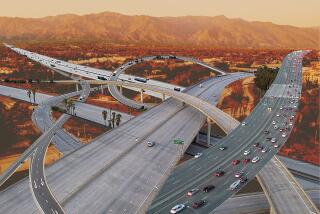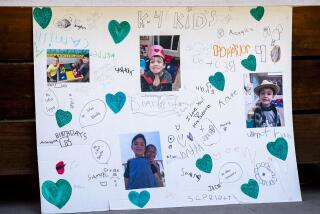Power to the Freeway Wimps : Many of Us Drive the Way We Live--Much Too Aggressively
- Share via
My advice: Be a wimp; freeways are no place to be assertive. But what is a freeway wimp? The Second Barnhart Dictionary of New English defines wimp as an unathletic or unaggressive person often considered a weakling or sissy. In contrast, freeway wimps are powerful people. They are not only safer drivers but also harder workers, more effective parents, better lovers. Incidentally, freeway wimp is gender-neutral. We don’t have wimps and wimpettes.
Yet it seems to me that if all we learn from the freeway violence is how not to get shot at, it would be sad. Even sadder would be seeing people returning to aggressive, impatient driving behavior when all the hoopla about getting killed dies down.
Rather than pointing a finger at “those nuts,” let’s examine our driving behavior, and how our driving might reflect the way we live the rest of our lives.
Many psychologists and psychiatrists now classify people as either Type A or Type B, according to personality. Type A’s demonstrate two key behaviors: the hurry sickness and free-floating hostility. The hurry sickness is the need to do more and more in less and less time. Driving behavior that illustrates the hurry sickness includes speeding, tailgating, passing on shoulders, abrupt lane changes and doing two things at the same time, like driving and telephoning. Free-floating hostility is most dramatically demonstrated by shooting at another motorist. Other signs of hostility include honking the horn, cursing, pounding the steering wheel and making obscene gestures. Type A’s tend to struggle with everything and everyone.
Type A behavior increases as the demands that we place on ourselves increase. Clearly, Los Angeles freeways are bringing out Type A behavior on a large scale. Type A’s are basically insecure people desperately striving for love and acceptance, which they somehow never attain. I know of what I speak, both professionally and as a recovering Type A for the past five years.
Type Bs, on the other hand, tend to wax philosophical about matters that don’t seem to have dollar-and-cents value. Freeway wimps have traditional values: patience, courtesy, faith and respect for older drivers and others whose driving skills may not be quite so sharp. Freeway wimps may use alcohol in moderation, but don’t drink and drive or take drugs.
They enjoy driving, listen to quiet music or talk shows, not letting the radio or traffic interfere with their tranquility. Their car is their refuge--a place to get away from the demands of work and home. Freeway wimps take the attitude “If I’m late, I’m late.” But they usually allow extra time to arrive at their destination.
Freeway wimps rarely get angry, seeing it as pointless. They don’t respond to provocations from other motorists. They drive with a smile on their faces and don’t fight the traffic. All they do when they drive is drive, giving full attention to the task at hand. They don’t think about work, review problems or do other things in the car, like shaving or putting on makeup.
Freeway wimps are powerful because they make a choice to let other drivers do whatever they want--unless, of course, the wimp is in danger. At that point, freeway wimps take action. They get out of the way safely and without anger, feeling sad for the other driver whose tailgating, rude lane changes and other aggressive acts reflect an individual bent on self-destruction.
Speeding, tailgating, abrupt lane changes--particularly without signaling--and passing on shoulders are not in a freeway wimp’s playbook. What’s the hurry? Life is a marathon race, not a 100-yard dash.
It takes self-confidence to be a freeway wimp--insecure people rush and get angry and sometimes fire guns at others. It also takes awareness of one’s habits. Many people, known by their acquaintances to be road generals, deny their aggressive and impatient style of behavior to themselves and others. It also takes practice, at least six months’ worth. I’ve been working on changing my behavior for five years, and I still blow it more often than I’d like. We so-called experts can’t do it for you. You’re the one who must practice freeway-wimp skills each and every time you get into the car--particularly when you’re in heavy traffic or late.
It’s to be hoped that our local and state officials will respond to the freeway crisis by setting up educational programs on driver stress through traffic schools, courts and the Department of Motor Vehicles. Our children and children’s children deserve an opportunity to become freeway wimps, too.
More to Read
Sign up for Essential California
The most important California stories and recommendations in your inbox every morning.
You may occasionally receive promotional content from the Los Angeles Times.













